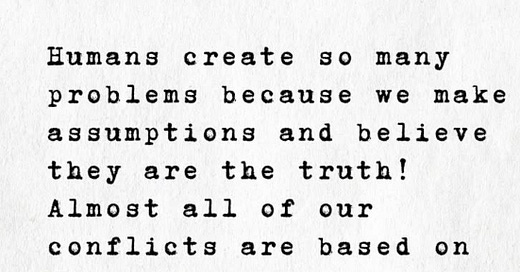Let’s dive right in:
Then there’s this timeless classic: “Never assume, because you’ll make an ass out of you and me.”
So what do we do?
We assume anyway. Jump to conclusions. Inject and project our own assumptions into and onto other people’s words. In meetings. At dinner tables. In emails. In texts. Any conversation. Any two people. Creating drama, leaving us sitting alone, stewing in it all—when it’s not even real.
Yet, we respond as if it’s fact. We fill in gaps with made-up stories. We decide what someone meant, we conclude why they did something, and we predict what they’ll do next.
And in the workplace, when we raise a conflict with the intention of getting it resolved?
We’re told, “Assume positive intent.” (As if *our* intent in wanting to resolve a matter is negative.)
We’re told, “Come on now, you know no one came in to work today intending to be an ahole.”(Asifwe′reanahole for bringing up a conflict.)
The knee-jerk reaction is to minimize the conflict and to marginalize the conflicted. Constructive feedback is misfiled as a complaint.
All in the name of being nice.
Seriously?
That approach isn’t about empathy. It’s about doing the easy thing—doing nothing to avoid discomfort, to keep things pleasant. It’s not about positive intent either. It’s about not making makes, not rocking the boat.
All in the name of being nice.
But maybe—just maybe—when we have a difficult and honest heart-to-heart with someone, that is actually the nicest thing we can do. In the name of honesty. And compassion. And improvement. And progress.
Imagine that.
You can be empathetic and truthful. Honest and nice. Direct and not a jerk.
Ignoring red flags?
It’s easy, sure.
But it’s also potentially deadly, literally and figuratively.
Assuming—whether you assume positive OR negative intent—isn’t the answer. Assumptions don’t keep the peace—they hold the truth at bay.
And what good does that do anyone?
So wherever you are—be it a meeting room, group chat, or family Sunday dinner—when you find yourself reacting without really knowing, stop assuming and start asking. Ask for clarity. Ask what someone meant.
Ask questions—life isn’t a giant Mad Lib so stop filling in blanks with your own worst-case cheap fiction.
This week’s song is Authority Song by John Cougar Mellencamp. Not because I am promoting chaos, suggesting you question authority for sport. But because I am suggesting you challenge the status quo, when it doesn’t make sense. I’m not encouraging you to stir the pot, but when things don’t add up, we need to speak up—without assuming the best or the worst. Without assuming we’re wrong. Without assuming someone else will take care of it. This song is a wink and a nod to disruption, maybe with a touch of defiance—not disorder.
Have the “hard” conversations—and fight authority if you must.
At work. At home. Anywhere. Including the authority in your own head.
Assumptions are not answers. They are dealers of dysfunction—thieves of truth, bandits of balance, pickpockets of peace.
Keep your valuables close. And your values closer.
Want some help figuring it all out? Check out this reflection guide to help you make space to get back to the things that matter to you:



